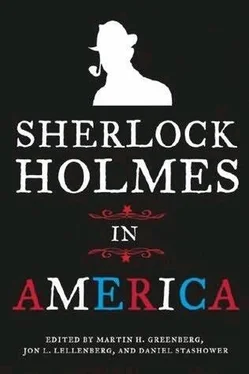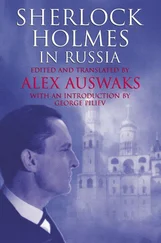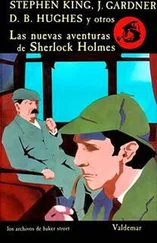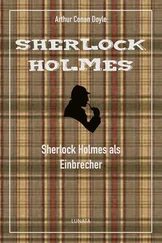And yet, we had no evidence that anything of the sort was being contemplated. A dead queen bee and a dead Mrs. Tingley were two very different things.
The next day, Spalding surprised me by offering me a round of golf. The hilly desert landscape struck me as a highly unlikely place for the Scottish sport, but he assured me that his private course was as challenging as, and far more interesting than, any I had experienced before. Holmes encouraged me to play, suggesting that his day would be spent more profitably, perhaps, but with considerably less enjoyment.
The nine-hole golf course sat on the eastern edge of the colony. The putting greens, their emerald grass well tended and heavily watered lay amid roughs that were rougher than anything found in Europe. Stray balls hid behind cacti, rolled down the canyon, lodged in twisted branches of mesquite, and seemed bent on defying all attempts to get them safely onto the minuscule patches of grass. It was a most enjoyable game, and I thanked my lucky stars I had chosen to leave Holmes to the bees.
At the close of the game, I thanked Spalding and went in search of Holmes. I found him in the avocado grove gazing through his binoculars at the neat white beehives. The intense blue of the sky and the waves and the strong sun bouncing off the white buildings were almost painful to the eyes.
Suddenly Holmes turned and darted off in the direction of the Spalding house. I followed hastily and caught up with him just as he reached the porch. I followed him through the front door and into the kitchen. He took a wooden bowl, opened a sack of flour, and dusted the sides of the bowl. He opened the pantry, removed a jar of honey with the Lomaland label, and spooned a glob into the center of the bowl.
“Come, Watson,” Holmes said, his eyes alight with the fervor of the chase. “Let us track our murderess.”
Mystified, I followed as Holmes strode, bowl in hand, toward the North House, in the opposite direction to the hives. When we reached a bed of blue Nile lilies, he set the bowl on the ground near the flowers and motioned me to join him some several feet away. I watched as bees landed in the bowl and edged toward the glob of golden honey.
One of the bees, having drunk its fill, landed on one of the flowers. It rested there a moment and then moved off and flew in its drunken way to the next.
The look on Holmes’s face was one I had never seen before. It held all the suppressed excitement I knew from past adventures, yet there was something alight in his eyes. I fancied I had a glimpse of the youthful Holmes studying bees on his grandfather’s land. It stood to reason that a man of scientific bent had once been a boy of scientific bent.
We waited for about ten minutes as bees came and went. Finally, Holmes crouched closer to the flowering shrub and examined a bee that sat on a blossom. I looked closely, too, and realized that its underside bore a coating of white. The flour! This was a bee that had sampled honey from Holmes’s bowl. Had it returned to the hive with its load of nectar and come back to this flower for more? And what did Holmes hope to learn from watching its progress?
When the flour-marked bee tired of this stand of blossoms, it zigzagged its way to the beds beside one of the Lotus Houses. Holmes picked up his bowl and moved it to an area four feet to the east of the flowerbed.
With each successive movement of the bowl, we moved further and further away from the Point Loma apiary in an easterly direction. Looking closely, I could see that now several of the bees wore white flour stockings on their little legs.
Following honeybees proved to be a tedious activity. We waited for the return of the flour-dusted bees to our little trap, and Holmes smiled when they brought others to feed on the glob of honey. At last we reached the end of the cultivated Lomaland grounds and entered the scrub wilderness at the edge of the settlement. We were heading away from the ocean and toward the mainland from which the elephant’s trunk of Point Loma jutted. I trudged after Holmes with a thousand questions in my mind. Something pink in the distance resolved itself into a magnificent stand of rosebay bushes. Their pink blooms and dark leaves glowed in the strong afternoon sunlight. I marveled at the sight; everything else around us was scrub. Someone must have brought water to these flowers-but who and why? There was no habitation that I could see nearby.
Holmes raced toward the bushes as if Moriarty himself could be found at their center. I puffed as I ran alongside my friend, the pain in my leg growing sharper with every step. The heat of the day, combined with my English tweeds, produced a flood of perspiration that dripped from my forehead.
“Surely, there is no need for this immoderate haste,” I said at last, bringing my gait to an exhausted walk.
Holmes slowed his step, but only slightly. “As to the need for haste,” he replied, “I will not be certain about that until I find what I am looking for.”
“And what,” I puffed through gasps of breath, “is that?”
“Beehives,” he said as he plunged into the wall of bushes, heedless of the hundreds of bees buzzing around the pink flowers.
“But, Holmes,” I protested. “We know where the hives are.” I gestured in the direction of the rows of white boxes, some two miles to the west.
As I pushed aside a heavy-laden branch, a bee buzzed at my face. I brushed it aside, and then realized my mistake. “Oh, I see,” I said. “You mean there could be a natural hive out here.”
Holmes’s answer was grim. “There is nothing natural about this hive, Watson, or about the placement of it among these particular trees.”
The blooms were lovely, the shade ranging from palest to deepest pink, the masses of flowers hanging with heavy profusion upon the dark-leaved branches. Rosebay, a lovely spring bloom, also known as-
“Oleander,” I said aloud. My eyes opened wide; I understood Holmes’s urgency. “One of the most poisonous plants known to man.”
“Indeed,” Holmes said. I could hear him ahead of me in the overgrown grove. I followed his voice and step, making my way through thick branches and increasingly agitated bees.
“Aha,” he said at last. “Come quick, Watson.”
I pushed aside the last branches and found myself in a small clearing. In the center, a large hollow tree stump buzzed with insect life.
“Honey made from oleander nectar will be as poisonous as the plant itself,” Holmes said. “The keeper of this rogue hive made certain these bees would feed on oleander by locating the hive here.”
Holmes took two steps toward the tree stump. I took two steps back. The honeybees, already agitated by strangers in their midst, buzzed loudly and menacingly. I felt a sharp stab of pain along the side of my neck and slapped at it automatically. “I’ve been stung,” I cried.
“As have I, several times,” Holmes replied. “It is the occupational hazard of the beekeeper.”
Holmes inched closer and closer to the hive, and the bees, sensing danger, began to swarm around the hive and Holmes. Soon, he seemed enveloped in a cloud of angry, buzzing insects.
Bees were everywhere, crawling inside the hollow log. Holmes, brave as ever, crept closer to the hive and peered in. He shielded his face from the bees with his handkerchief, but I could see that this was wholly insufficient to guard him from stings.
He raised his head, and the look on his face chilled my blood. “The honeycomb is gone,” he said. “There is no time to lose.”
I understood at once. Mrs. Tingley had expressed a preference for honey straight from the comb. She might be eating her deadly treat at this very moment.
We were both stung over and over again as we fled the oleander grove and made our way as fast as we could back toward the colony.
Читать дальше












